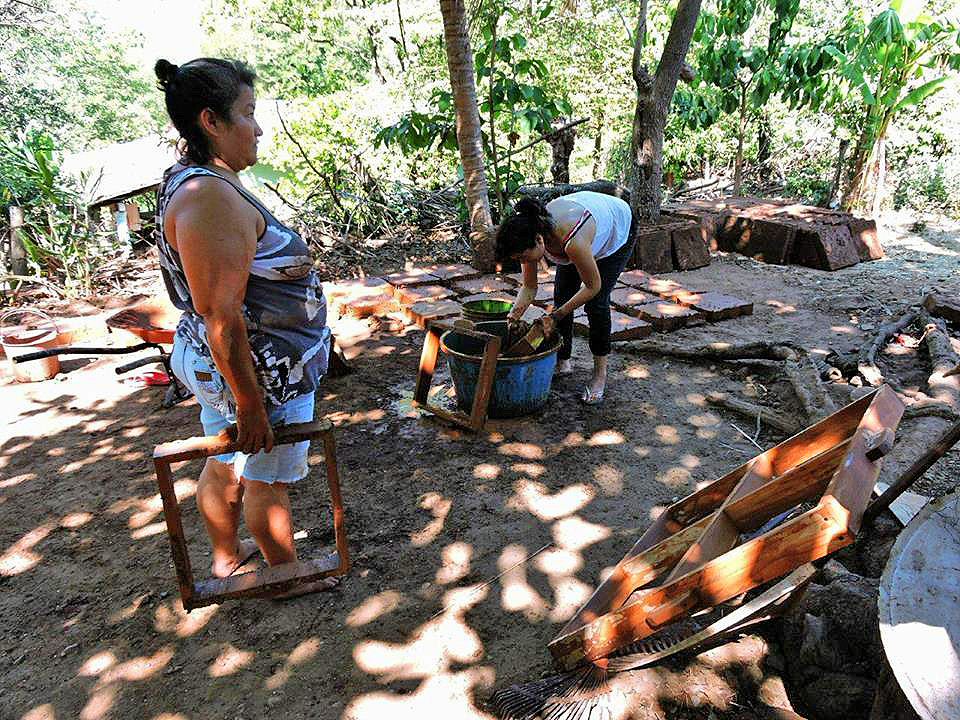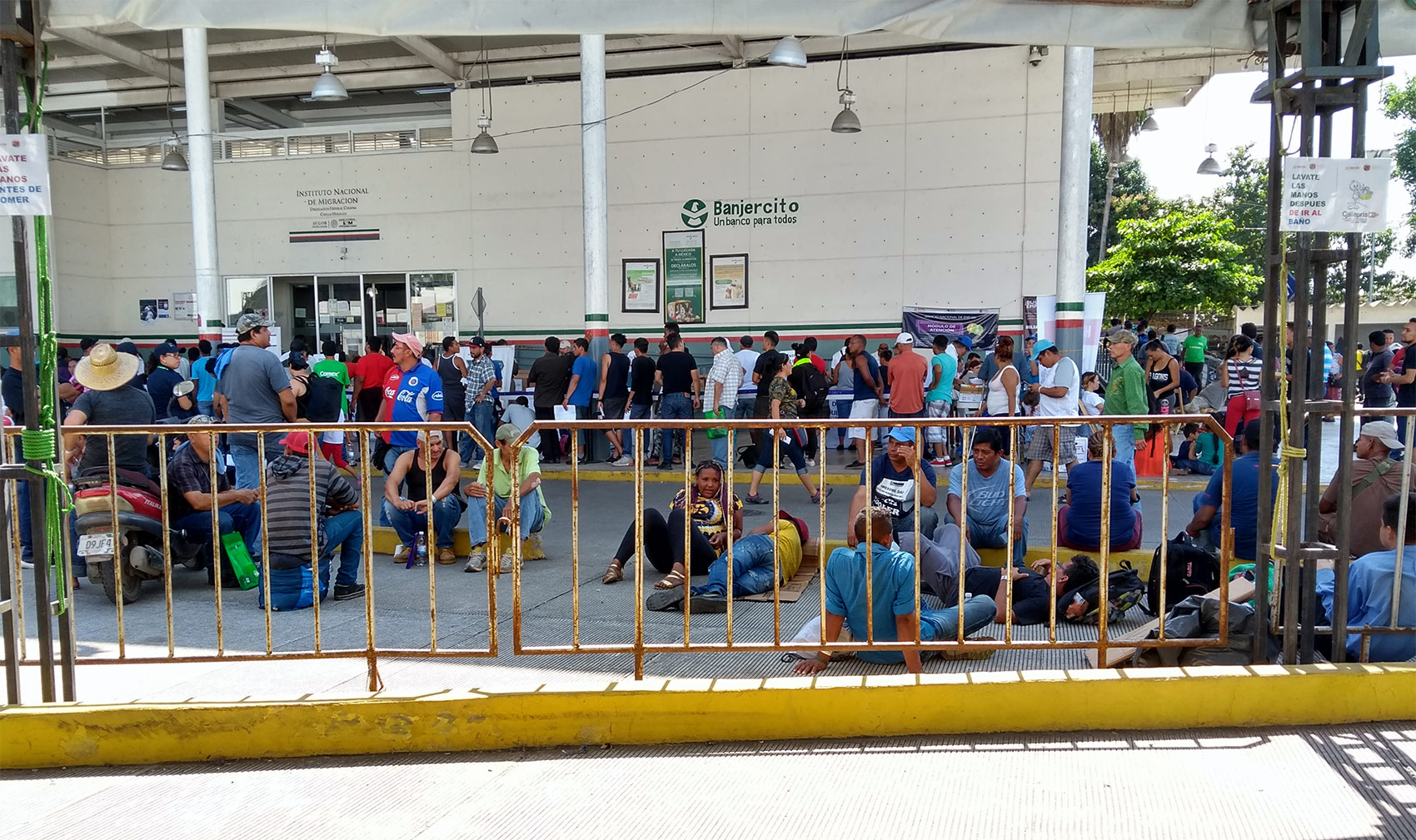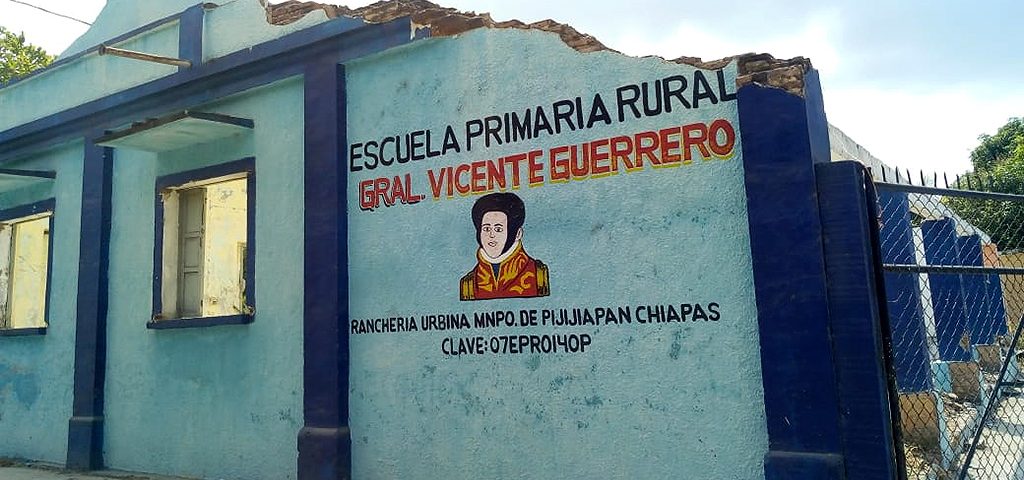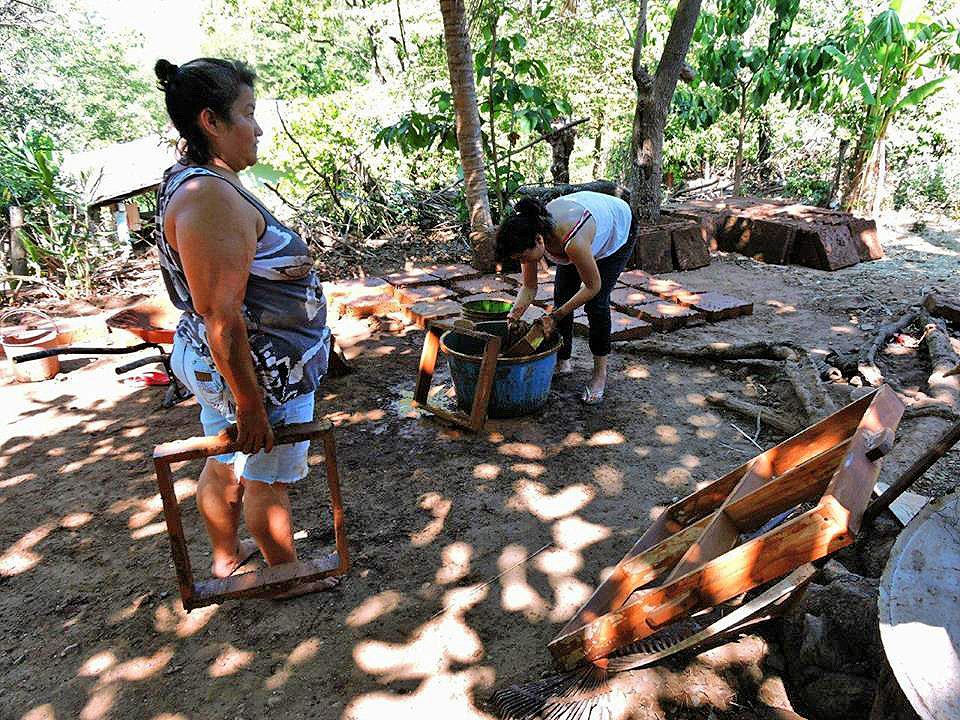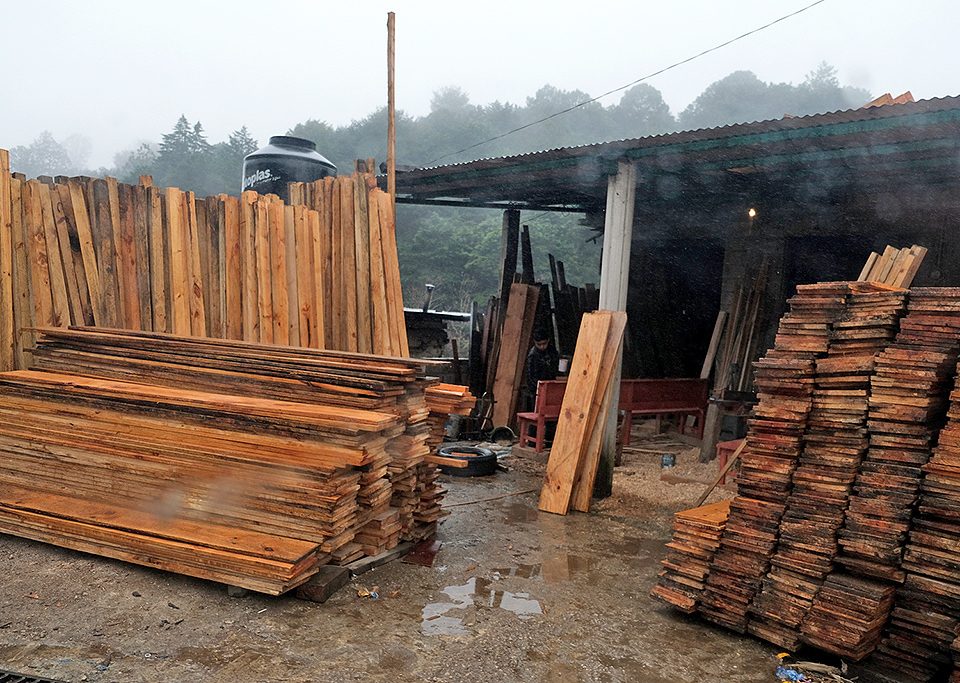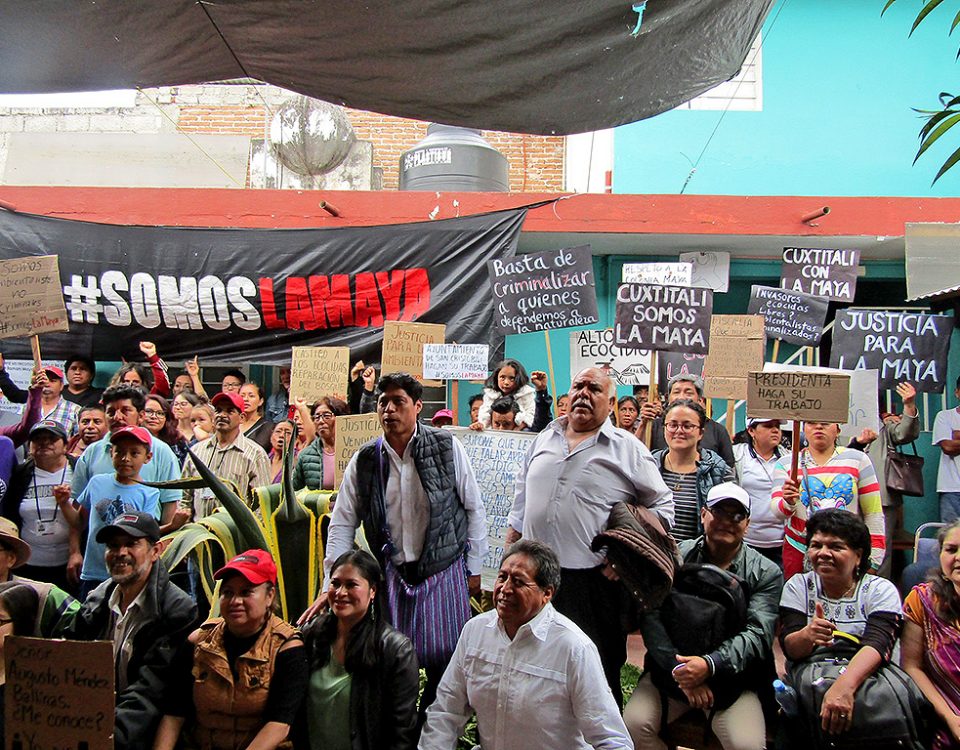ARTICLE: Earthquakes – Community Reconstruction as an Alternative Route
27/09/2019LATEST: Mexico “happy, happy, happy”?
19/12/2019
INTERNATIONAL PRESENCE AND ACCOMPANIMENT
CHIAPAS
Civil Observation Missions
- From May 29 to 31, we participated in the “Civil Observation Mission to the Humanitarian Crisis of Migrants and Refugees in the Mexican Southeast”. Composed of 24 organizations, academics, and journalists, the mission covered various points of control and migration installations on the coast and southern border of Chiapas “in order to strengthen the documentation and accompaniment that local organizations have carried regarding the Central American exoduses of recent months.”
- From June 1 to 3, we visited the camp on the Mexico-Guatemala border where more than 400 displaced people continue to live, two years and one day after their forced eviction from the Laguna Larga community of Guatemala.
- In June, we participated in a civil observation mission to monitor the central corridor (Comitan, Frontera Comalapa, and other cities in the mountains of Chiapas), an alternative migrant route to that of the Coast, for entry into Mexico.
Highlands
- In May, together with members of our Board of Directors, we met with members of the Movement in Defense of Life and Territory (MODEVITE in its Spanish acronym) in Cancuc, who ratified their opposition to the construction of the super highway between San Cristobal de Las Casas and Palenque, considering that such a project would not at all benefit the affected communities.
- In July, we visited the displaced peoples of Colonia Puebla, municipality of Chenalho, where they are staying in San Cristobal de Las Casas.
- In August, we accompanied the pilgrimage organized by Las Abejas Civil Society in San Cristobal de Las Casas and accompanied by Pueblo Creyente (Believing Peoples) and several organizations from Chiapas and Mexico. This comes 12 years after a decision of the Supreme Court of Justice of the Nation which resulted in the release of “20 paramilitary prisoners, material perpetrators of the Acteal massacre” as “political strategy to avoid investigation around the main intellectual authors of said massacre.”
Northern Jungle
- In June, we met with several civil, social, and ecclesiastical organizations in the municipalities of Palenque and Chilon.
- In August, we participated in a space of risk analysis and defense strategies, in the context of threats received by the Center for Indigenous Rights (CEDIAC AC in its Spanish acronym) and the Jesuit Mission of Bachajon in its accompaniment to the movements of indigenous peoples who seek to exercise their right to self-determination through the constitutional path to community governments in Chilón and Sitala.
Border region
- In May, we participated in an analysis meeting with various civil and religious actors in the area to discuss the prevailing context in the region.
Gender
- In May and August, we were present at the quarterly Assembly of the Diocesan Coordination of Women (CODIMUJ in its Spanish acronym) that took place in San Cristobal de Las Casas.
- In June, in the midst of multiple threats, we accompanied an organized march in San Cristobal de Las Casas by the LGBTQ+ community.
- In June, we attended the Forum “Love, Care, and Rights of People regarding their Biocultural Heritage” convened by the Center for Women’s Rights of Chiapas in San Cristobal de las Casas.
Prisoners
- Since May at least once a month we have visited prisoners who are members of the organizations “Solidarios de la Voz del Amate” and “La Voz de Indígenas en Resistencia”, both groups adhering to the Sixth Declaration of the Lacandon Jungle of the Zapatista Army of National Liberation (EZLN in its Spanish acronym), in the San Cristobal de Las Casas prison. We were also present at public events convened by the Network “No Estamos Todxs” to highlight the situation of the prisoners. In June, we accompanied activists and relatives in a 12-hour fast in front of the prison located in San Cristobal, in solidarity with prisoners on hunger strike, as well as to demand their release.
Events
- In May and August, we participated in the Assembly of Pueblo Creyente (Believing Peoples) of the diocese of San Cristobal de Las Casas.
- In June, we were present as observers in the symbolic takeover of the military garrison in San Cristobal by dozens of members of civil groups, women of Las Abejas Civil Society and members of the diocese of San Cristobal de Las Casas, who accompanied the Tzeltal sisters Ana, Beatriz, and Celia Gonzalez Perez to demand justice for those who were victims of torture and rape by soldiers in the municipality of Altamirano 25 years ago.
- In July, we attended a press conference in which environmentalists and ecological defenders from different neighborhoods and subdivisions of San Cristobal de Las Casas stated their concern about the current situation of ecological spaces in the city, and in particular the “criminalization of the defenders of the movement of Colonia Maya.”
- In July, we were present as observers at the forum held in San Cristobal de Las Casas in the framework of the Free, Prior, and Informed Consultation Process for the Constitutional and Legal Reform on the Rights of Indigenous and Afro-Mexican Peoples.
OAXACA
- In June, we attended the Regional Meeting “The Isthmus is Ours” which included the participation of 21 municipalities in the states of Oaxaca and Veracruz, an event attended by 350 community authorities, teachers in Section 22 of the National Coordinator of the Education Workers (CNTE in its Spanish acronym), and human rights organizations.
- In August, we made a one-week visit to Oaxaca where we met with several partner organizations in the City of Oaxaca: Unitierra, Consortium for Parliamentary Dialogue and for Gender Equality, Tequio Juridico, EDUCA, BARCA-DH, Ser Mixe, and the Ixtepecano Committee in defense of the territory. We were also present at the alternative Guelaguetza held in San Martin de los Cansecos, Oaxaca, which was convened by several Zapotec communities of the Central Valleys, members of the “No to Mining, for a Future for All.”
INFORMATION AND TRAINING FOR ACTION
ANNOUNCEMENTS AND URGENT ACTIONS
- Guarantee the safety of the Bachajon Mission team and of CEDIAC in Chiapas (Peace Network, June 20, 2019)
VISITS, DELEGATIONS, AND TOURS
- We received delegations, students, journalists, and members of our coalition interested in deepening their knowledge of the situation in Chiapas, Oaxaca, and Guerrero, and the work of SIPAZ. In July, we coordinated a Global Exchange (US) delegation for a week.
- In August, we met with members of Missionary Week, in The Hague, Holland.
PUBLIC RELATIONS
- At the end of May, we met with Fernando Perez Robles of the Human Rights Directorate, and Cesar Argueta, advisor to the state government delegations, to address several concerns regarding various cases of forced displacement in Chiapas.
- In July, we met with members of the Embassies of Denmark, Finland, Norway, and Sweden in San Cristobal de Las Casas.
- We met twice with state and municipal authorities, in our accompaniment of displaced people from the community of Banavil, Tenejapa, who continue to seek progress in solving their case.
PEACE EDUCATION
- In May, we facilitated an analysis of reality with the Network of Chiapas Women against Violence and for the Right to Live in Peace in San Cristobal de Las Casas.
- In June, we facilitated a workshop at the Analysis Meeting convened by Services and Assessment for Peace (SERAPAZ in its Spanish acronym) in Ocosingo, which was attended by more than 50 people from the highlands and jungle regions of Chiapas.
- In July, as part of the Mother Earth Support Network (RAMAT in its Spanish acronym), we facilitated a day and a half on biblical foundations of creation care, with participants coming from the different areas of the diocese of San Cristobal de Las Casas.
INTERNAL TRAINING
- In June, we participated in a space of analysis and strategic reflection on the response by the international community to the human rights crisis on the southern border, in which the Swedish Movement for Reconciliation (SweFOR) and Voces Mesoamericanas also participated.
- In June, in a follow-up to the process initiated in 2018, we participated in a digital security workshop facilitated by the Sursiendo collective.
NETWORKING
- We attend the bimonthly meetings of the Network for Peace, a space for action and reflection composed of ten organizations that seek to support peace and reconciliation processes in Chiapas.
- In April, for Mennonite Central Committee’s bimonthly webinar which it organizes with its partners in Mexico, SIPAZ gave a presentation titled “The challenge of human rights in Mexico and the participation of Catholic and evangelical churches in its achievement. ”
